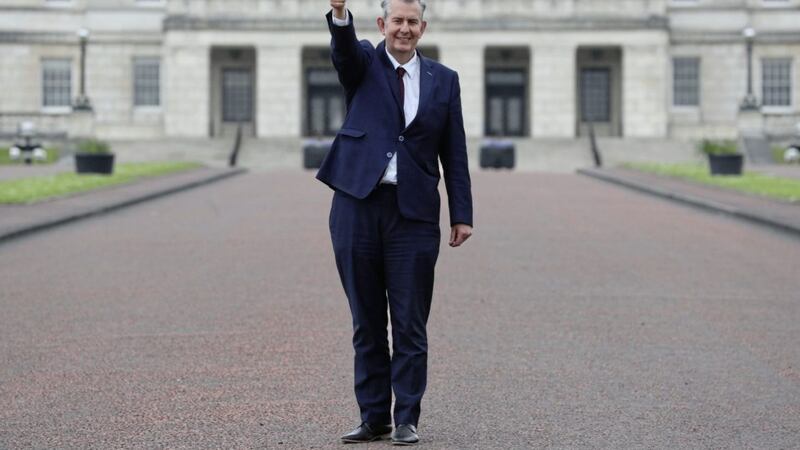Edwin Poots has ruled out any DUP moves to collapse Stormont, as hinted at by his defeated leadership rival Jeffrey Donaldson. Asked about the Irish language legislation promised in New Decade, New Approach, Poots expressed his full support for the deal.
This is doubly revealing because everyone at Stormont knows Covid has scuppered the timetable to pass the legislation before next year’s scheduled election. Arlene Foster and Michelle O’Neill acknowledged as much at an assembly committee last month.
Poots could have used the inevitable delay to grandstand against the legislation, pick a sham fight with Sinn Fein or risk a real fight, as the DUP cannot nominate a new first minister without republican cooperation.
Instead, Poots focused on the New Decade, New Approach pledge to introduce the military covenant. Expect to hear more of this, despite it being meaningless in Northern Ireland, as it involves preferential access to housing and healthcare that cannot be provided under our equality laws. It is a great distraction though, especially when the new leader of the UUP has a Military Cross.
**
Violence is “an absolute last resort” in opposing the Brexit sea border but “I am not sure if and when violence will be the answer” and “I would not rule it off the table.”
So said 19-year-old Joel Keys, a member of the Loyalist Communities Council, speaking by video link to Westminster’s Northern Ireland Affairs Committee.
MPs were aghast and UK newspapers reported a serious loyalist warning to restart the Troubles.
Ironically, the LCC had put Keys forward because it felt older members with paramilitary pasts would be unable to speak about the protocol without sounding threatening. Under a cross-party grilling, the youngster then fluffed his lines. Still, he can take heart that raising Brexit-related violence has not harmed his political prospects. One day, he could be taoiseach.
**
Her Majesty’s Inspectorate of Constabulary, Fire and Rescue Services (HMICFRS), an oversight body for England and Wales, was played by both sides in Northern Ireland in 2013 when it produced a confused report into the Historical Enquiries Team that allowed the Troubles legacy body to be shut down, as desired by both republican activists and PSNI management.
It is hard to avoid the sense of history repeated itself with HMICFRS’s report into the Bobby Storey funeral. The PSNI is cleared of “any bias towards one community” on the grounds it would have taken the same approach to the funeral of “a leading figure in the loyalist community”.
This is a finding of bias against the law-abiding community, which neither the police nor a policing oversight body should be presenting as vindication.
**
When Michelle O’Neill declined to meet Prince Charles on his centenary commemoration visit to Northern Ireland this week, it was widely reported to be because of his role as colonel in chief of the parachute regiment.
DUP MP Gregory Campbell denounced this as “a step backwards” and “an act of disrespect”.
Yet all O’Neill said was “on this occasion a meeting was not possible”.
Her statement added: “The British royals have made a very positive contribution to the development of peace and reconciliation.”
The plain fact is a meeting was not politically possible one week after the Ballymurphy inquest verdict and Sinn Féin was as respectful about it as anyone could have asked.
**
Northern Ireland has lost control of its hospital waiting lists, Prof Deirdre Heenan of health think-tank the Nuffield Trust has told Radio Ulster. With parties clearly in pre-election mode, this is a timely reminder that devolution was only restored because of the waiting list crisis. Voters exhausted by constitutional and culture war arguments turned to Alliance to signal a demand that Stormont return and refocus on the NHS.
Although that message was received, it appears it needs to be sent again.
**
Sinn Féin’s pre-election purge has moved from Derry to South Down, where assembly member Emma Rogan has been deselected for failing to sufficiently build her public profile. Chris Hazzard, the constituency’s MP, must also be under the party microscope. He lost 7.5 percentage points in the last Westminster election and came within three points of handing the seat back to the SDLP.
A former Stormont minister, Hazzard now spends an undue amount of time tweeting solidarity with Venezuela. In his defence, an abstentionist MP has little else to do.
**
The DUP and Sinn Féin joined forces at Belfast City Council to sink a Green Party motion against letting private taxis into bus lanes.
Sinn Féin councillor Ronan McLaughlin restated his party’s bizarre claim that “this comes down to a class issue” as “the vast majority of taxi drivers come from working class areas.”
Where does he think bus drivers and passengers come from? Monaco?
The taxi industry began lobbying for access to Belfast’s bus lanes in 2018, weeks before the launch of the Glider system. Driver’s union Unite says this is really about “influential private taxi owners” trying to “undermine” a £110 million taxpayer investment in public transport.
A party with headquarters named after James Connolly really ought to be on the side of the transport workers union.








